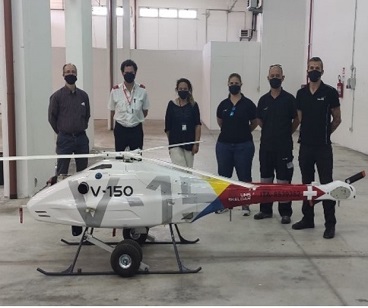News
24 June 2021
Satellite-based Procedures for Unmanned Aircraft Systems. ENAV into play with the European project ECARO
A multidisciplinary project whose main objective is the adoption of European satellite navigation systems GNSS, EGNOS and Galileo for all civil aviation applications like fixed wings operation, drones and rotorcraft emergency operations.

Grottaglie 24 June 2021 – The experimentation and demonstration campaign of the ECARO (Egnos Civil Aviation ROadmap) project, performed at Grottaglie Airport, has just ended. Its results were discussed at the online conference GNSS-BASED AUTONOMOUS UAS FLIGHT - DEMO DAY, in which representatives of EUSPA (Eruopean Union Agency for the Space Programmes), ENAC, Aeroporti di Puglia, DTA (Distretto Tecnologico Aerospaziale), ASI (Italian Space Agency), D-Flight participated along with the ECARO Consortium Partners, coordinated by ENAV.
ECARO is a multidisciplinary project whose main objective is the adoption of European satellite navigation systems GNSS (Global Navigation Satellite Systems) EGNOS and Galileo for all civil aviation applications like fixed wings operation, drones and rotorcraft emergency operations. The project is co-financed by EUSPA.
ENAV, together with the Consortium Partners DTA (Aerospace Technological District of Puglia), Planetek and UMS Skeldar, is mainly engaged in the experimentation activities with drones while Airgreen support the validation of satellite navigation applications for helicopters.
The flight test campaign on satellite procedures tested the application of civil aviation flight procedures also by using a Swiss UMS Skeldar drone, so to demonstrate their integration in an airport environment and the benefits obtained from the exploitation of the European GNSS systems EGNOS and Galileo.
The trial was carried out at Grottaglie airport, with tests anticipated by the flight clearance process as set up by ENAC (the Italian Civil Aviation Authority) in accordance with the new European regulation.
Aeroporti di Puglia and ENAV participated in the preparation and implementation of the flight test campaign, upholding the safety and security of all the operators interested in exploiting Grottaglie Airport.
Thanks to the ECARO project, it was demonstrated that the European GNSS systems (EGNOS and Galileo), in addition to GPS, are capable of ensuring drones to perform safe satellite-based approach procedures, a capability required to include and integrate drones in controlled airspace.
To monitor GNSS signal quality, Planetek Italia has tested a radiofrequency spectrum monitoring system at airports, which could improve the safety and security of UAS operations.
The results of the project will contribute to define the roadmap for ENAC’s advanced air mobility and will support the development of a national experimental research center for urban air mobility.
Another strategic activity of the ECARO project is the planning and validation of GNSS routes for low-altitude helicopter rescue flights. For such validation, RIFIS (Repositionable IFP Flight Inspection System) was utilized, an ENAV innovative in-house developed mobile platform, capable of recording and validating trajectories and flight standards, object of the trial according to the standards set by ICAO, the International Civil Aviation Organization. The first validations for the Tyrrhenian side were successfully performed in June by ENAV personnel with the support of the pilots of Airgreen helicopters and of Leonardo Helicopters.


